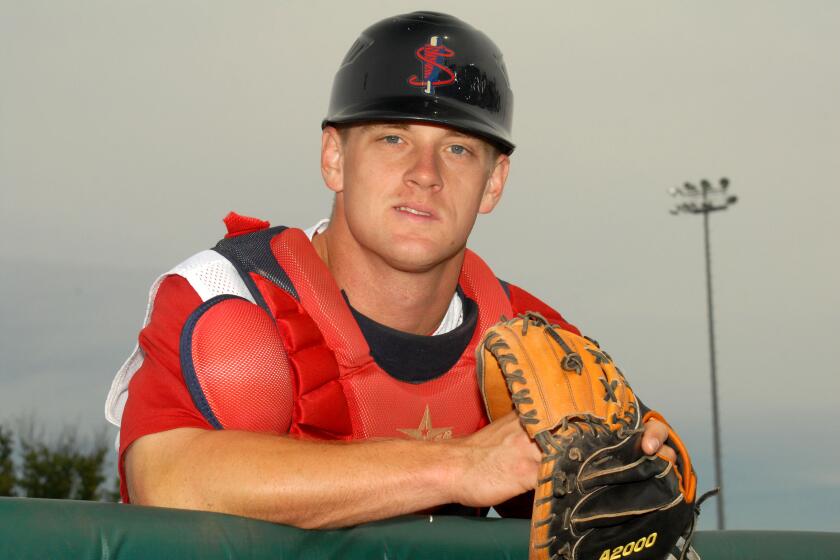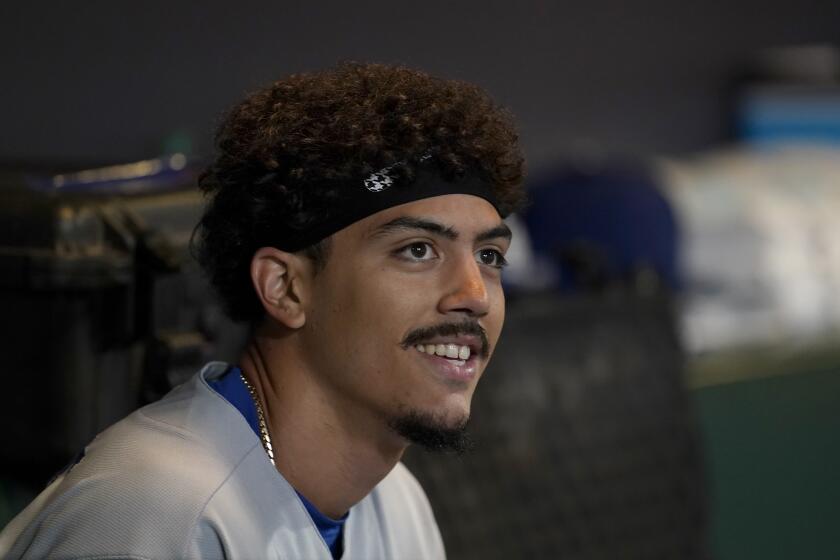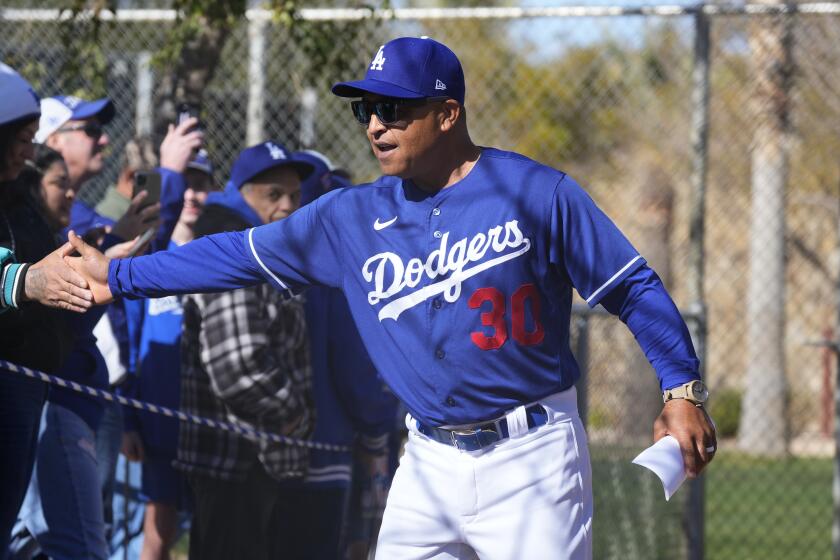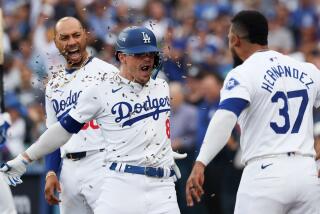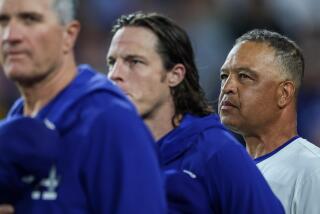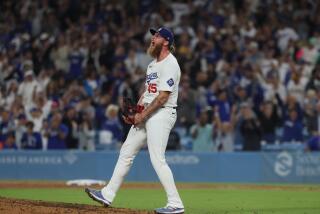‘You can see some real gains’: Why Dodgers hitters are becoming Driveline regulars
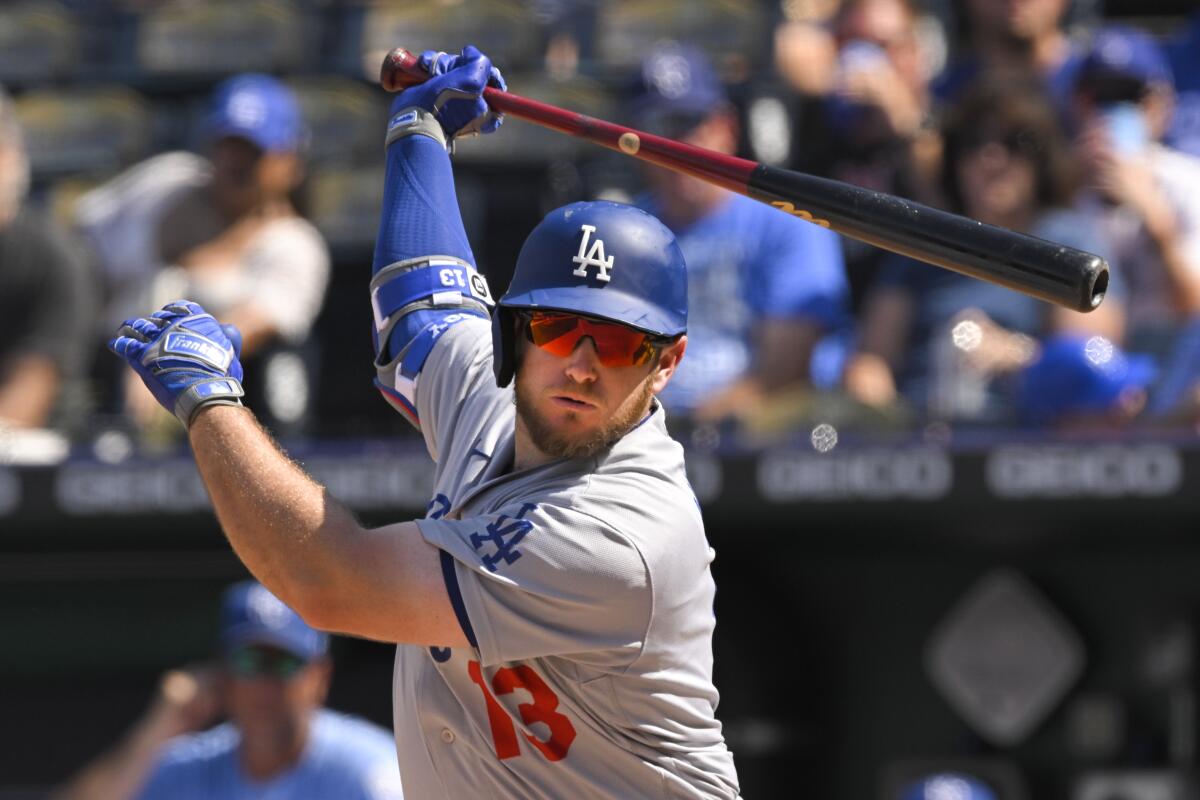
PHOENIX — It took just one day for Max Muncy’s routine to change this offseason.
Three months removed from the Dodgers’ postseason elimination, and more than 1,000 miles away from the team’s home facilities, the veteran third baseman found himself just south of Seattle in January, spending an afternoon at Driveline Baseball.
The trip to the renowned data-driven training center hadn’t originally been his idea. It came as a suggestion from Dodgers hitting coach Robert Van Scoyoc shortly after the 2022 season.
Muncy wasn’t certain what to expect, having believed Driveline was a place pitchers went to improve with the help of cutting-edge technology — not their counterparts at the plate.
Yet in the ever-evolving world of advanced baseball development, Driveline offered an intriguing opportunity. In the last several years, they’d crafted a hitting program designed to refine swing mechanics, build strength and, most crucially, increase bat speed.
J.T. Watkins, a video coordinator suspended by MLB for his part in the Red Sox sign-stealing scandal, will help the Dodgers form game plans for hitting.
So, Muncy agreed, becoming one of six Dodgers hitters who made the trek to Driveline this winter in a pilgrimage organized by the team.
“I was like, OK, I’ll give it a shot, why not?” Muncy recalled this week. “If it increases my bat speed, if it helps me catch up to fastballs with guys throwing harder than ever, if it helps me play longer into my career — there was no downside to it for me.”
The Driveline visits have emerged as an early storyline in camp this spring. In addition to Muncy, Mookie Betts, Chris Taylor and Gavin Lux also said they trained there over the offseason.
“We just thought there was some opportunity with certain guys to go up there, get some information on them,” Van Scoyoc said, discussing what he called a “collaborative process” between the Dodgers and the Driveline team.
“What we’re always trying to do is find ways to improve,” general manger Brandon Gomes said. “And as we talked through it, we viewed it as an opportunity to bring to our guys.”
While Dodgers players have trained at Driveline in the past, it was typically pitchers. Since its founding in 2008, Driveline had earned a reputation for helping even accomplished big leaguers add velocity, break and spin to their repertoire.
“You hear Driveline,” Muncy said, “you automatically think pitchers.”
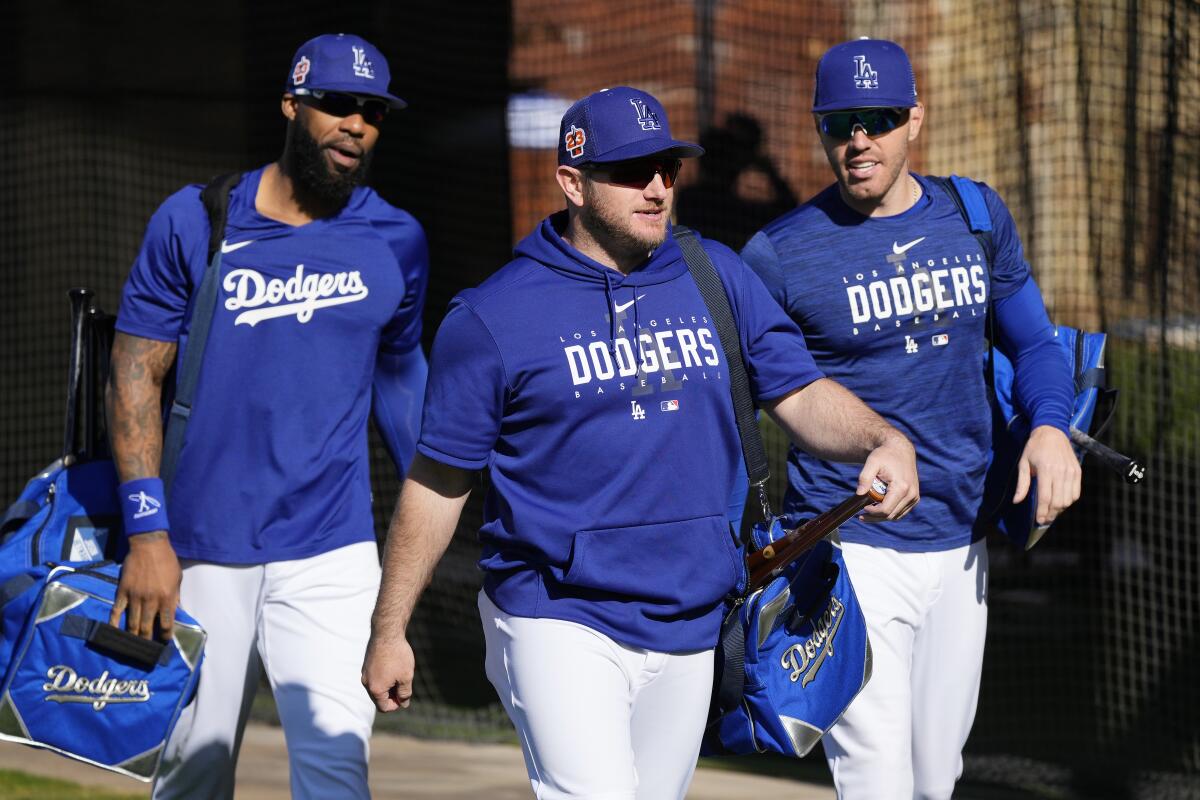
“With everyone throwing 100 [mph] now, we’ve got to be able to catch up to it.”
— Max Muncy, on the importance of bat speed
This offseason, however, the Dodgers made a concerted effort to send hitters to the facility as well — a “coach-driven” initiative, Gomes said, prompted by Driveline’s intriguing bat speed program.
“It was just a thing with certain guys we thought might help,” Van Scoyoc said. “We wanted to investigate it.”
Like other Dodgers hitters who went to Driveline this offseason, Muncy’s visit featured a couple key steps.
There was biomechanical testing in which motion-capture cameras and wearable sensors measured every component of Muncy’s powerful swing, even creating 3D animations that showed how each body part interacted throughout the motion.
There was instruction on a specialized system of weighted bat training, teaching Muncy a series of drills he later incorporated into his offseason activity.
“The whole theory was just increasing bat speed,” Muncy said.
Follow along for the latest news and analysis from Dodgers spring training at Camelback Ranch in Phoenix ahead of the 2023 MLB season.
It isn’t a new revelation in the baseball community.
The same way pitchers have always tried to throw the ball harder, batters have long sought reliable ways to quicken their swing without sacrificing mechanics.
“With everyone throwing 100 [mph] now,” Muncy said, “we’ve got to be able to catch up to it.”
What’s different about Driveline’s new system, according to Van Scoyoc, is its ability to compile mountains of swing data and incorporate the information into newly developed training techniques.
“I just think the way it’s organized and tracked, that’s the new part of it,” Van Scoyoc said. “It’s just being a little bit more informed about where guys are at.”
Some of the hitters the Dodgers approached about going to Driveline this winter simply obliged the suggestion.
“My employer told me I need to go,” Betts said of his trip, which prompted him to bulk up by 8 pounds coming into spring. “There’s only one way to find out, but so far I definitely have gotten a lot stronger and beefed up a little bit, so we’ll see how it goes.”
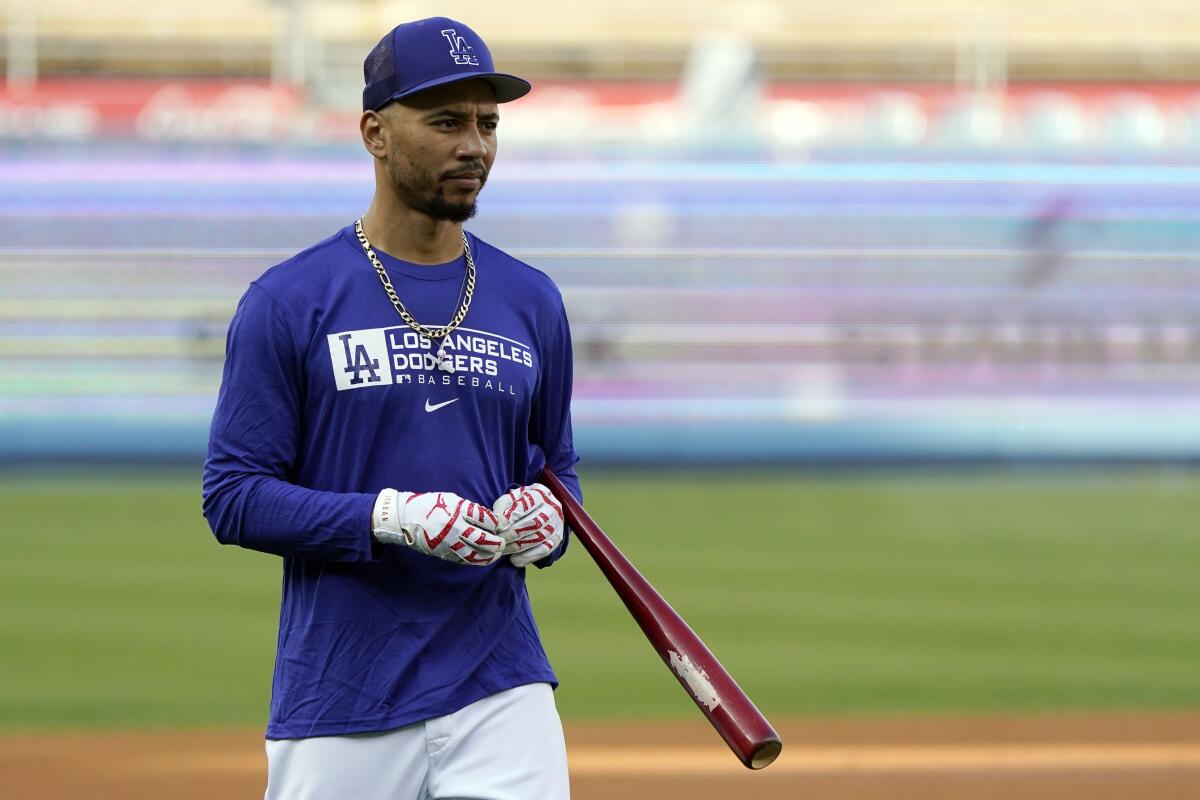
Others were intrigued by the opportunity.
“If you’re not taking advantage of all the resources given to you then, you know, what are you really doing?” Taylor said earlier this month. “I think it’s important to be open minded, and some of this new stuff that we’re adopting in the game is obviously working and helping a lot of players. I think it would be very stubborn to not give it a shot.”
Taylor also pointed to the season-long benefits of having such detailed swing data on hand for Dodgers coaches to evaluate.
“I think that information is very valuable,” Taylor said. “For me, I keep things as simple as I can and I think it’s more valuable for our hitting coaches for them to tell me what to do.”
Lux, meanwhile, has seen dividends from his session, most notably a substantial 6 mph gain in bat speed.
“I’m a vision guy,” Lux said. “So when you put up a 3D picture of my skeleton and what my body is actually doing, you can get a way better idea” of how to improve your swing.
Dodgers manager Dave Roberts has been a beacon of positivity in spring training, rediscovering his love for the team after last year’s playoff meltdown.
The Dodgers aren’t the only team hoping to benefit from Driveline’s hitting program, which gained industry recognition last year after it was credited by St. Louis Cardinals third baseman Nolan Arenado during his MVP-caliber season.
While it’s unclear how much it will impact their results during the season, Van Scoyoc said he’s encouraged by early returns.
“Oh yeah,” he said. “You can see some real gains.”
The Dodgers’ hope is that the impacts won’t be limited to just home runs, slugging percentage and bat speed, either.
Thanks to the offseason Driveline trips, Van Scoyoc said the Dodgers can now engage in “more informed coaching” — with more data and techniques at their disposal heading into the upcoming season.
“I think it’s been pretty beneficial so far,” Muncy said. “I think everyone got their own thing out of it.”
More to Read
Are you a true-blue fan?
Get our Dodgers Dugout newsletter for insights, news and much more.
You may occasionally receive promotional content from the Los Angeles Times.

